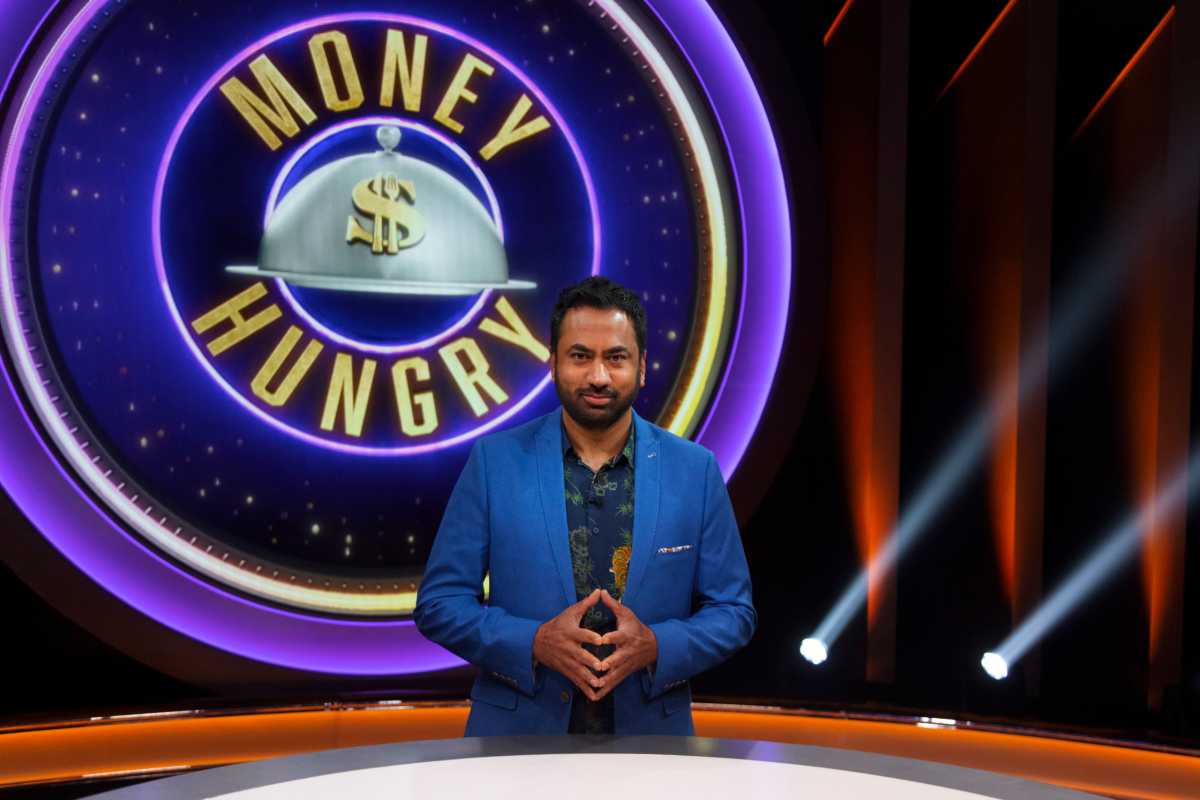A huge part of enjoying a meal is tasting everything a dish has to offer, and what one new Food Network show examines is just how savvy some people can be at doing just that. Actor and former Obama White House staff member Kal Penn returns to our screens this week to host ‘Money Hungry,’ a competition show that takes talented chefs, restaurant critics, cookbook authors and accomplished home cooks through a series of challenges to win $50,000.
Contestants might be blindfolded and have to decipher missing or added ingredients, or have to put their skillset to the test to identify a global seasoning, on top of many other culinary twists and turns. It’s all in the name of bringing together people and culture through food, and that’s one of the reasons Penn signed on in the first place. The other reason the host notes is the effect ‘Money Hungry’ can have on anyone, not just foodies, when it comes to sharing plates and sharing stories.
Penn sat down to chat more about ‘Money Hungry’ and how this non-cooking competition show can teach us more about food than ever before.

Why did you want to host ‘Money Hungry’?
I love the idea that food is one of the things that can bring people together story-wise. I did not go to culinary school, but for the last 5 or 6 years, I was really interested in being an amateur foodie. So, when this came around, I jumped at the chance to host it because it was a show that was food-related, uplifting and fun.
With your idea that food tells a story, how does this show help exemplify that?
The show itself is a competition show based on people’s sense of taste… with [food] competitions, you normally see contestants go head to head with cooking against each other so you learn about the process of cooking, but in our space, you learn about the process of tasting. Our contestants are mostly either food bloggers or restaurant critics, or food writers—so these are people who live in this food industry. They’re not amateur chefs, they’re a few steps up from that, but they’re also not head chefs at 5-star restaurants.
What was cool about that was all of the cooking was done off-camera by a team of our chefs and when the episode starts going, the challenge that I present to contestants comes out on a fancy silver plate with [something] on top of it. I lift the cover and they see the plate for the first time (unless they’re blindfolded which is also happens sometimes and then they start the challenge) and the challenges can be really simple. One ingredient [could be] missing, like salt, or cinnamon is missing from the cinnamon toast crunch.
They get more complicated as the challenges go on, so at about the 10-11 level and all the way up to the 15 which is the last one. With those challenges you need to have an understanding of food and a library of information about where ingredients might come from and then if they win all 15, they walk away with $50,000. That’s kind of the point in which it turns from just being something that the layperson can decipher. One of the challenges I remember was being the correct answer to something was a spice that originated from Iran years ago that’s very common in Persian cooking. It’s not something you might necessarily know if you didn’t grow up eating Persian food or if you’re a foodie. That’s what I mean when I say it brings people together or it teaches you something. It’s a unique take on a competition show because you’re not cooking, but that deconstruction of what went into the dish was so interesting to me.
Are there any surprises audiences can expect?
Definitely. There are a couple of curveballs that I think are interesting, and I’m sure the contestants are like, ‘Oh my gosh, I can’t believe they’re making us do this.’ But, for the audience, I mentioned some of the challenges the contestants have to be blindfolded because they have to tell you some things that might be missing or some things that have been added to what they’re tasting. Obviously if they could see it, they would know right away. But if you don’t have your sense of sight and you’re used to relying on that to compliment your sense of taste, it’s really interesting what a curveball that throws on how you’re used to processing types of information.
And with some of the dishes, that’s tough with the spices or the ingredients or the method of cooking and some of the more complex challenges, some people might be more familiar than others. That goes right down with the ingredients, too. There’s a challenge where the contestant needs to tell me which of the three dried crickets have which type of flavoring to them… I think a lot of food shows would go, ‘Oh my gosh, I can’t believe you’re eating crickets,’ but we didn’t want to fall into that trap. For a lot of people around the world crickets are a primary source of protein so we saw an opportunity: Why don’t we actually talk about where around the world that might be a thing?
It’s not from where the suburbs where I grew up, so if I was a contestant I might not be familiar. But another contestant said, ‘Oh yeah, I’ve tried cricket because I really like Mezcal and I was in Mexico City where they served [that] with a side of orange and crickets.’ We kind of present all of the dishes and all of the ways it tells a story. Instead of saying I can’t believe you’re eating insects, it’s more about, oh interesting where is this a primary source of protein and how did it make it to a plate in a studio in Harlem where we shoot the show?

What is the most fun part of hosting for you?
I would say the most fun part about hosting the show was realizing all of the stuff that you can actually do as an audience member. There were a number of these challenges where I’m talking to these contestants and we try and I would say, ‘I can’t believe that you’re able to do this with your sense of taste.’ And they would say, ‘Look, 30% of it might be yes, I’m born with this amazing sense of taste that I’m blessed with, but the other 70%, you can train your tongue and your palette to learn these things.’ You don’t need to go to culinary school to learn it, you can do it at home.
So ever since the show ended, I’ve come home and I’ve tried some of this stuff. When I’m watching the show with my 12 year old cousin or if I’m watching it with my parents, you’re going to walk away from the episode going—should we do that when we’re cooking dinner and try it? That was enjoyable for me to see also.
Catch ‘Money Hungry’ every Tuesday on Food Network.






























